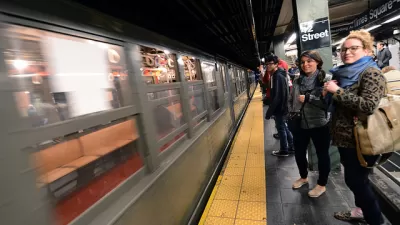It was touch and go there for a little bit today, but in the end President Trump signed a $1.3 trillion omnibus spending bill that spares many transit and community development programs.

President Trump signed a $1.3 trillion omnibus spending bill into law today, averting a government shutdown and resolving the ongoing mystery of how much funding for capital investment in transit and programs for the Department of Housing and Urban Development would survive the Republican party's control of Congress and the presidency.
Here's how Michael Grunwald describes the political drama that has flavored the Trump Administration's spending and legislative priorities in the first year-plus of its existence:
President Donald Trump’s budget proposals have taken a hatchet to President Barack Obama’s top priorities. They’ve called for deep cuts in renewable energy, medical research and nonmilitary spending in general. They’ve eliminated TIGER, a grant program for innovative transportation projects created by Obama’s stimulus bill; ARPA-E, an energy research agency launched by the stimulus; and CDBG, a community development program many Republicans consider an urban slush fund.
What then was the actual result of all those pronouncements by the Trump Administration? "Now the Republicans who control Congress have passed a $1.3 trillion omnibus spending bill, and it not only protects Obama’s priorities, it expands them," writes Grunwald.
President Trump's displeasure with the substance of the omnibus spending bill could be detected throughout the day leading up to his signing the bill. He spent the morning threatening to veto the bill and said he would "never sign another like this," but sign the bill, he did.
For more details on the substance of the omnibus spending bill, see articles posted earlier this week by Dylan Matthews for Vox and another by a trio of reporters for the Washington Post. CBS and the AP published an article about the details of the bill earlier this week. Planetizen Correspondent Irvin Dawid also reported on the consequences of the bill for the beleaguered Amtrak Gateway Program.
Here are a few key takeaways with regard to federal programs that fund planning efforts around the country:
- The budget for the TIGER transportation grant program will triple. (As noted by Angie Schmitt earlier this month, however, the TIGER grant funding under the Trump Administration might not resemble the transit-friendly program of the Obama Administration).
- The budget for the Community Developement Block Grant will almost double, from $2.8 billion to $5.2 billion.
- The Census Bureau receives $1.34 billion increase in funding over last year's allocation in the bill (the 2020 Census will still be a subject of concern).
- Trump wanted to slash the Energy Department’s renewables budget 65 percent; instead, Congress boosted it 14 percent.
- $1.6 billion for border security—but with limitations on how the money can be spent (i.e., it can't be spent on the president's pet border wall project).
FULL STORY: Congress releases $1.3 trillion spending bill — here's what's in it

Maui's Vacation Rental Debate Turns Ugly
Verbal attacks, misinformation campaigns and fistfights plague a high-stakes debate to convert thousands of vacation rentals into long-term housing.

Planetizen Federal Action Tracker
A weekly monitor of how Trump’s orders and actions are impacting planners and planning in America.

In Urban Planning, AI Prompting Could be the New Design Thinking
Creativity has long been key to great urban design. What if we see AI as our new creative partner?

King County Supportive Housing Program Offers Hope for Unhoused Residents
The county is taking a ‘Housing First’ approach that prioritizes getting people into housing, then offering wraparound supportive services.

Researchers Use AI to Get Clearer Picture of US Housing
Analysts are using artificial intelligence to supercharge their research by allowing them to comb through data faster. Though these AI tools can be error prone, they save time and housing researchers are optimistic about the future.

Making Shared Micromobility More Inclusive
Cities and shared mobility system operators can do more to include people with disabilities in planning and operations, per a new report.
Urban Design for Planners 1: Software Tools
This six-course series explores essential urban design concepts using open source software and equips planners with the tools they need to participate fully in the urban design process.
Planning for Universal Design
Learn the tools for implementing Universal Design in planning regulations.
planning NEXT
Appalachian Highlands Housing Partners
Mpact (founded as Rail~Volution)
City of Camden Redevelopment Agency
City of Astoria
City of Portland
City of Laramie





























